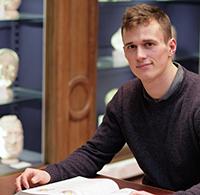Honours project selected for BORS 17
Congratulations to Robbie Miller, an intercalating medical student, who has been selected to present his Physiology Honours project at the British Orthopaedic Research Society meeting in September.
Tell me about your area of interest in research?

I am interested in orthopaedic surgery. As far as orthopaedics goes the most common medical emergency is septic arthritis; which results in rapid cartilage destruction causing high rates of long term morbidity with the associated poor joint outcome. As well as this the mortality rate associated with this disease is high (~10%) and has remained unchanged despite advances in medical practice. This; therefore, warrants further research into the disease orientated at improving outcomes. As an orthopaedic enthusiast the opportunity to carry out research in a crucial area of this field was relished
What's your project about?
Septic arthritis is caused by bacterial infection of joints. As a result the use of suitable and effective antibiotics is paramount.
In my project I created a model of septic arthritis using bovine cartilage and then altered the treatment of septic arthritis accordingly to determine the effect these alterations had. Different classes of antibiotics which eliminate bacteria through different mechanisms were used and compared. The first class directly kills bacteria by causing bacteria to lyse (burst). The second stop the bacteria replicating allowing for the bodies immune system to clear the infective pathogen. It has been suggested that bacteria some of the bacteria causative of septic arthritis store toxins intracellularly. Therefore using antibiotics that cause bacteria to burst would lead to joint cartilage being exposed to additional toxin and hence cause further cartilage damage.
This projected tested this hypothesis by comparing the two antibiotic classes and measuring cartilage cell death after treatment with the different antibiotic classes using a microscope.
How were you selected for the BORS presentation?
Orthopaedics is arguably one of the most competitive fields in medicine. As a result the challenge of having research accepted at the annual British conference is colossal. To have this research accepted I firstly had to make sure the project and the data collected were of the utmost quality, this then had to be conveyed with a well written abstract. Once an abstract summarising the key aspects of the research was refined it was sent to the British Orthopaedic Research Society for review/acceptance. This process required a large investment of time.
How do you feel about presenting?
The ability to effectively portray research is a crucial component of a career in any medical profession. As a result the opportunity to present research that I have carried out at a national conference as significant as BORS would be immense. I am a confident individual and would find this presentation exhilarating. Whats next for your career?
After completing Bsc in Phyiology I will enter year 5 of medical school. At this point I will then continue to develop as an academic and a clinician, allowing for my career aspirations in orthopaedics to be realised.
Related links
British Orthopaedic Research Society website
Watch video on Intercalated Honours in Physiology at Edinburgh

